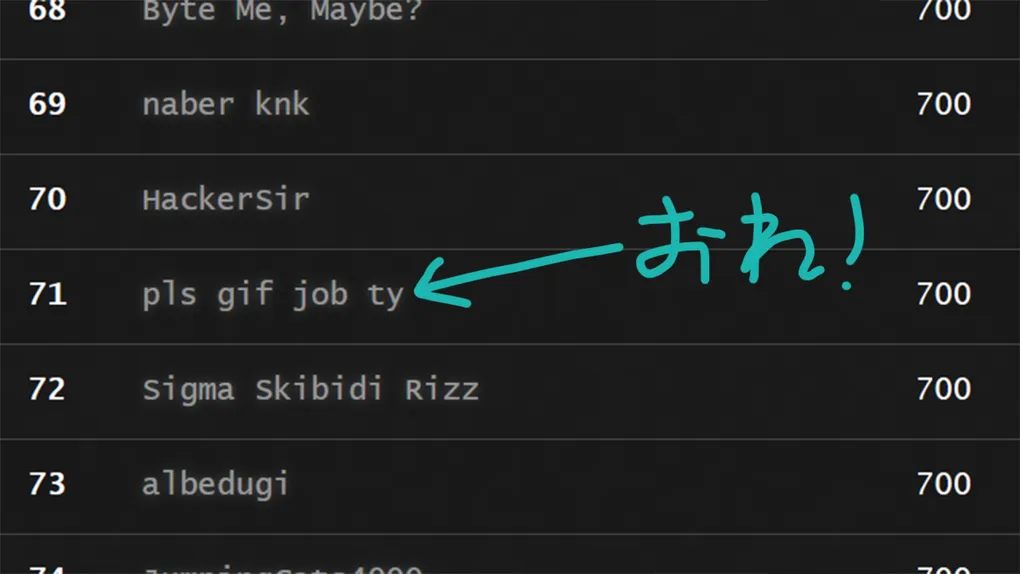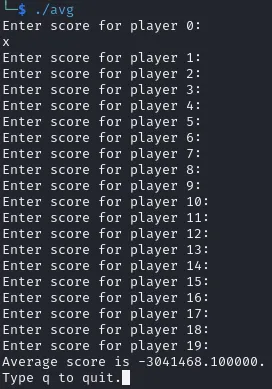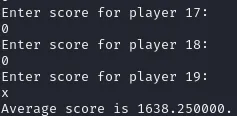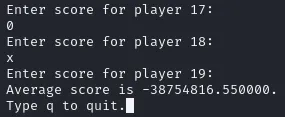
TBTL CTF 2024 - Enough with the averages
Moving all of my past CTF write-ups to this website…
Just did my first CTF in at least 8 years! I’ve never been great at them, but 700 points and 71st place out of 792 teams isn’t so bad. If I wasn’t busy preparing for a trip to Japan, I think I could have gotten another 200 or 300 points, but oh well!

Hoping this will hopefully help with my job search, let’s do a write-up here on LinkedIn! Also, I haven’t done a write-up in as many years, and writing them is fun.
Challenge
Here’s what the challenge looks like:

And here’s the code provided with the challenge:
// gcc -o chall chall.c -Wextra
#include <stdio.h>
#include <stdlib.h>
void read_flag() {
FILE* in;
char flag[64];
in = fopen("flag.txt", "rt");
fscanf(in, "%s", flag);
fclose(in);
}
void vuln() {
int score[20];
int total = 0;
for (int i=0; i<20; i++) {
printf("Enter score for player %d:\n", i);
scanf("%d", &score[i]);
total += score[i];
}
printf("Average score is %lf.\n", total/20.);
printf("Type q to quit.");
while (getchar() != 'q');
}
int main() {
setbuf(stdin, NULL);
setbuf(stdout, NULL);
read_flag();
vuln();
return 0;
}Analysis
In principle, these kinds of challenges require providing some special input in order to get the flag.
It honestly took an embarrassing amount of time to solve this because I’m both rusty
and am not the best at binary exploitation to begin with.
Most of that time was trying to exploit scanf to somehow magically overflow past &score[i]
and into another part of the stack that the function call to scanf would jump back to at the end —
ideally to something that outputs the flag.
This is impossible here (I think), as I’m sure people more skilled than I could know at a glance.
In particular, %d won’t allow that to happen no matter the input — only reading 4 bytes,
which I suspected but tried endlessly anyway.
There are two important keys to solving this challenge.
First, read_flag reads the flag into the stack (of the read_flag function).
Second, if scanf tries to read an input incompatible with the provided format, it will do literally nothing.
First, let’s create our flag file locally (foobarfffffffffffffffffffffffffffffffffff in my case),
run the program, and see what the stack looks like, let’s say, just before we scanf.

Even though we’re in a different function (vuln) to where the flag was read (read_flag),
it’s data is in this functions stack (aka between rsp and rbp)!
This is the first key: that read_flag’s stack data — in particular the flag read to the stack — is accessible to vuln.
for (int i=0; i<20; i++) {
printf("Enter score for player %d:\n", i);
scanf("%d", &score[i]);
total += score[i];
}
printf("Average score is %lf.\n", total/20.);
printf("Type q to quit.");We have 3 printfs to utilize to try to get the data exfiltrated.
One is a static string, so it’s out.
Another is for printing i — a value that will only ever be 0-19, so it’s also out.
Luckily, total is dynamic, so hopefully there’s a way to use it to get the data we want.
total’s value is produced by adding score[i], so perhaps the score array is relevant.
Let’s try providing the program a bunch of zeroes and see what the stack looks like.

Perfect! We can easily see that the score array overlaps with where the flag was previously read to.
This is where the second key comes in: we can stop scanf from overwriting the flag by providing an invalid value —
like the character x. total will then be computed with the values of the flag.
Unfortunately, since the program doesn’t print the score array directly,
we need to exfiltrate the data using only the total variable and the corresponding printf.
If we start by providing the character x as player 0’s score, we get the average,
which we can multiply by 20.0 to get the total.
Since we never overwrote the score array, this total is the sum of the values
that happened to have been in the stack at the time — which we know includes the flag.

And here’s where it started to get obvious for me, and probably you as well!
If we provide zeroes for players 0-18 and x for player 19,
the total will be zero plus whatever was in the stack at score[19].

Here’s the unnerving part. The stack is non-deterministic, and the values might vary between runs. To see if that will be a problem here, we do the same thing again. Luckily, the same value came back!
Now let’s do the same as last time, except we’ll provide x for player 18.

And so on and so forth!
Exploit
Let’s perform this on the server, this time. Note that it gave nice-and-neat zeroes for the last few entries (unlike in my local code), and I excluded them as they won’t be necessary. Also note that I, via the debugger, had already found out that the flag starts at the player 4 entry, so I excluded 0-3 as well.
-25787339.550000,
91481479.900000,
-6823664.050000,
-91936488.950000,
79868497.900000,
-12567975.050000,
-56350006.300000,
-99532309.300000,
16910501.950000,
-27039161.350000,
88410919.350000,
44628132.750000,
6.250000We can multiply these by 20 to get the totals from these averages. Furthermore, we can consider them as ints, instead of doubles, because that’s what total is, and we don’t lose any data doing this. We’ll also reverse the set, since it’ll be easier to handle and reason about (don’t have to, though).
125,
892562655,
1768218387,
-540783227,
338210039,
-1990646186,
-1127000126,
-251359501,
1597369958,
-1838729779,
-136473281,
1829629598,
-515746791,
764843629We can actually convert these values back into the score array
(or perhaps more correctly: the score array as it would be with the underlying values being the flag)!
This set of numbers is a running sum of all the score,
and we need only subtract the prior value to get the original score.
Of course, with integer math, we had some overflowing when the total was computed, but that’s not a problem.
Here are the scores!
125,
892562530,//for example: 892562655 (see above list) - 125
875655732,
1985965682,
878993266,
1966111071,
863646060,
875640625,
1848729459,
858867559,
1702256498,
1966102879,
1949590907,
1280590420ints are all 32-bit, 4-byte integers, so let’s convert them to bytes and then characters.
}bl354r14rn_vr_d4_y0ul1z31714s_1ngG13r_ve_Y0u{e4tTBTLWoops! We reversed the numbers earlier on!
TBTL{e4t_Y0ur_vegG13s_1n1714l1z3_y0ur_d4rn_v4r14bl35}And that’s our flag!
Code
Since I’m a .NET guy, here’s the C# way to compute the solution. Note that I got the list of averages manually because meh.
double[] doubles = new[]
{
38242181.450000,
-25787339.550000,
91481479.900000,
-6823664.050000,
-91936488.950000,
79868497.900000,
-12567975.050000,
-56350006.300000,
-99532309.300000,
16910501.950000,
-27039161.350000,
88410919.350000,
44628132.750000,
6.250000
};
int[] ints = doubles.Select(n => Convert.ToInt32(n * 20.0)).Reverse().ToArray();
List<int> score = new();
int last = 0;
foreach (int n in ints)
{
score.Add(n - last);
last = n;
}
var strings = score.Select(
s => Encoding.UTF8.GetString(
BitConverter.GetBytes(s)
.Where(b => b != 0)
.ToArray()));
Console.WriteLine(string.Join("", strings.Reverse()));